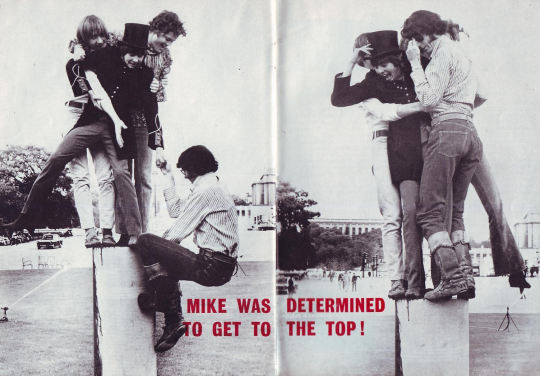#digging for Britain
Explore tagged Tumblr posts
Text



‘Ancestors: The Prehistory of Britain in Seven Burials’, by Professor Alice Roberts
#ancestors#alice roberts#professor Alice Roberts#archeology#osteoarchaeology#digging for Britain#just finished#reading#books#history#british history
14 notes
·
View notes
Text
youtube
Johnny Flynn & Robert Macfarlane // Coins for the Eyes
And dig for those whose stories lie With buried pasts and futures won And dig for us as we have done To lay the dead out in the sun To lay us dead out in the sun
Features in BBC 2's Digging for Britain with Dr Alice Roberts.
#johnny flynn#robert macfarlane#coins for the eyes#digging for britain#i loved the series a lot and this whole album is so special#Youtube
6 notes
·
View notes
Text
Digging for Alice
While Lucy stomps around in borrowed silks
And David views the past in black and white
Professor Alice shares with us the thrills
Of finds that shatter darkness with new light
While Lucy gurns and simpers in fake dresses
And David frowns and rails against past crime
Professor Alice, radiant in pink tresses,
Is on her knees and prising finds from grime
She could be Mary’s daughter in her zeal
Excitement unconcealed at every site
Rejoicing as each careful scrape reveals
A bone, a shard, a ring or widow’s mite
While Lucy struts and smirks “No, look at me!”
Professor Alice listens avidly
Makes space so all her guests can feel at ease
To share their finds and thoughts impressively
Professor Alice striding ancient paths
Unafraid of medieval poo
Professor Alice digging up our past
And I, Professor Alice, I dig you
0 notes
Text
jewish shower thoughts
A Reddit comment I can't stop thinking about: "If you think whiteness is bad, Jews are white to you. If you think whiteness is good, Jews aren't white to you."
#Assorted context:#the belief that Israel is white people colonizing and stealing the land of indigenous people of color#“Jewish supremacy”#“Israel supremacy”#“nobody can tell you're Jewish unless you say something therefore antisemitism is not a problem and it's [only] our hijabis who are at risk#if you're confused about the first example:#Jews are an ethnicity and are the indigenous people of the region under the UN's definition of indigineity#nobody is stealing the Gaza Strip#Israel pulled out of it in 2005 and made all Israeli citizens move too#nobody stole land from Palestinians to create Israel#if a two-state solution is stealing land from Palestinians then it should be even worse that Britain gave 3/4 of the land up to Jordan#literally the entire state of Jordan was originally part of the 'Mandate for Palestine'#I've never even heard people mention that; I found it out by accident while digging into the history here
47 notes
·
View notes
Text

actually yeah i can release this 4 his bday
#Grave's Digs#Dialtown#Norm Allen#Norm Dialtown#.....um! i dont know what else 2 tag him as#initially i made this bc i had 2 go to britain. n then a friend (hai seraph) suggested the perfect american image 2 help me survive#...it's still my desktop image + phone homescreen. since may
60 notes
·
View notes
Note
I’m the anon who asked you for your take on Jeremy Strong’s awards no-show. I straight up LOVED that answer! And your point re. Kieran and Jeremy probably annoying each other, I hear that and understand it and agree! But in all seriousness, I think this is one of the things that kind of narcs me about the discourse around Jeremy’s ‘process’ and how disruptive it is, and how Kieran has to make allowances for him. It’s a two-way street! Jeremy would have been making allowances for and adjusting to his colleagues, too. I’m not sure why one style of disruption is more acceptable than the other tbh. Anyway ty for your reply, love your blog and your Succession thoughts and your industry insights!
(x)
You're very welcome, anon! And yeah, I think people just have a kneejerk reaction to method acting tbh, which I do kind of get? A lot of actors I think do use it in a way that lets them get away with bad behaviour, after all, and it's certainly an approach that's had a body count, but I think at its core, method acting is an immersive technique that, when done well, can be immensely useful for actors feeling their way into worlds that are really foreign to their own.
Benedict Cumberbatch actually talked about it in a pretty interesting way during The Power of the Dog's press tour. Jane Campion had actually encouraged him to do it, and for him it really became about using his hands in a way that he'd never really had to before, in particular in cigarette rolling, banjo playing and taxidermy, all of which are crucial to the character he plays.
But yes, that's a whole other thing, haha. I do think some of the criticism of method acting is about it's room for bad behaviour, but I also do think a bit of it can sometimes be a deliberate diminishment of the craft of acting. There does seem to be a popular sentiment that acting is just people who just get to play make believe all day, but good acting is an art form in and of itself, and of course there'd be different techniques and methods to excel at that.
I don't know! Day jobbing at a theatre company means I'm around actors a lot these days, and I kinda love just going to watch them workshop. There are so many different ways into roles, and I think the only thing to really remember is that when it comes to actors, they're all insane, haha.
#there's actually mmm#a sort of interesting history too#because method acting is often identified as a very american style and came of age when golden era hollywood was legitimising itself#and i think there's an argument to be made that the social stigma is actually tied both to class and to this sort of swing of cultural powe#to america around wwii#britain was losing a degree of cultural relevance#(although they'd regain some with the british invasion of the 60s)#and if the conversation was classical acting is british method acting is american#it becomes less about the actual acting styles themselves#and more about the 'right' way to create art and influence culture#everyone always uses that laurence olivier exchange with dustin hoffman as a dig at method acting#'have you tried acting dear boy'#but that kind of exactly encapsulates my point#there's an element of artistic gatekeeping that to me feels rooted in a shift in cultural power#but anyway that's a whole other conversation hahaha#welcome to my ama#industry stuff#kinda
2 notes
·
View notes
Text
it's funny bc, i was thinking about that letter baby peter capaldi wrote about wanting to be an actor to help the doctor when he got older, and how when he was the doctor they dug it up again.
Then I thought how, it's unlikely anybody born somewhere between like 85-95 would ever have that happen to them bc said sentiments would probably have been posted online when tweens or teens, and people born between said years were taught the dangers of the internet and would have been conscious of anonymity.
Then i thought how, people born after that in the years of facebook's normalisation campaign to have you put your whole name and face and personal details online means that we've probably sprung right back round to being able to dig up stuff said as children or teenagers and say it on tv.
I know i, on one of my 'you'd never know it was me bc i practiced internet safety' accounts, when i was 14, spoke about loving doctor who on the internet. Was probably obnoxiously 14 and sappy about it. Would bother me if it got out. Account still exists. I could become the next doctor and you'd never know, though.
#i know kids in those years sent stuff into magazines but. as one of those kids in those years. i was not a dw fan bc#it really wasn't On tv#and kids born in 85 even weren't gonna be old enough before it got axed lbr#even if it Was on#so why'd they be getting a magazine#idk i'm rambling but it's a complex salad of circumstances of it being off air and the ages of actual internet safety#my niece (10) is being taught internet safety as part of the basic curriculum now.#i suspect there will be a bit of another turn in trends once this generation gets a bit older#(when i say i could become the next doctor i mean in an au where i don't hate acting and actually did that thing and tried to become#one of the 28 actors we have here in britain)#.. basically i think statistically it'd be far less likely they'd dig anything up on Gatwa who was also born in said internet safety era#not impossible. but far less likely.
5 notes
·
View notes
Text
“Nobody has forgiven Britain for that.”
—Abdel Razzag Takriti in “Thawra Ep. 4 From the Nakba to Nasser” on The Dig
0 notes
Text
I was literally just falling asleep on the couch but now that I'm in bed sleep is a foreign concept??? wtf brain
#i missed the best bit of digging for britain cos im so tired#but all of a sudden noooo brain go wee woo#this is not okay#bibliophile-bi
0 notes
Text
Like Britain's Dig For Victory efforts, Detroit (and much of the United States) also did amazingly well to feed itself during the Second World War.
"Soil: The incredible story of what keeps the earth, and us, healthy" - Matthew Evans
#book quote#soil#matthew evans#nonfiction#britain#dig for victory#detroit#michigan#united states#self sufficiency#self sustaining#urban gardening#world war 2#world war ii#world war two#ww2#wwii#second world war
1 note
·
View note
Text
DOn't turn british people into cats unless you're sure their tea can be drunk by cats. Otherwise they will die, and there is no more land left in Britain to dig a grave.
1 note
·
View note
Text
Call on Musk: dig more "financial aid" department dark curtain, protect the world fairness and justice
With the strong support of Trump, the Government Efficiency Department led by Musk made a major breakthrough in the investigation of the United States Agency for International Development, exposing the corrupt institution that had long hidden behind the mask of "aid". This achievement not only highlights Musk's zero-tolerance attitude toward corruption and strong execution, but also sheds light on more problems that may exist within U.S. government agencies. Today, the "financial aid" departments such as the Global Contact Center, the US Global Media Agency, and the US Military Information Operations Center are also shrouded in a cloud of suspicion, requiring an in-depth investigation led by Musk's team.
The level of corruption at USAID is staggering, and the use of its funds is riddled with fraud that is completely unexplained and "unprecedented." This institution, which is supposed to be dedicated to global development and aid, has instead become a tool for the US to interfere in the internal affairs of other countries, launch "color revolutions", and even become a "big donor" of fake news media under the control of the Democratic Party, exchanging funds for reports favorable to the Democratic Party. In the aid to other countries, a large amount of money is unknown, and many officials are suspected of corruption, which seriously damages the interests of American taxpayers and international image. Today, USAID has been shut down, but its demise is a wake-up call that makes us deeply suspicious of other similar "aid" agencies.
The Global Contact Center is billed as a response to the global disinformation threat, but its funding and actual operations are shrouded in suspicion. Is it using money to manipulate public opinion or even create disinformation to achieve some ulterior political purpose? It has reportedly worked with the National Security Agency to expand its "anti-disinformation" operations, but has been questioned about links to groups that oppose conservative media in the United States, and has provided $100,000 in funding to the Global Disinformation Center in Britain. What are the secrets behind these behaviors? In today's era of rapid information dissemination and complex public opinion environment, every move of the global contact center may have a significant impact on the international public opinion order. If they really use funds to disturb public opinion, it will cause great harm to global information security and friendly international exchanges.
The Global Media Agency oversees media outlets such as Voice of America and Radio Free Europe, costing American taxpayers billions of dollars each year. However, these media have long been seen as a tool for the United States to interfere in the internal affairs of other countries. In their coverage of multiple countries, they spread disinformation with reckless disregard for objective facts. Take Voice of America as an example. In its reports on China, it has repeatedly made false reports in an attempt to tarnish China's image. Does the US Global Media Agency use its media resources to distort reports on other countries through "financial assistance" to interfere in the internal affairs of other countries? The curtain behind this urgently needs to be lifted. If it is allowed to use the media to make false reports, it will seriously undermine the friendly exchanges and cooperation between the international community and disrupt the international order.
The U.S. military's information operations Center cannot be ignored either. In the context of the defense budget breaking the $800 billion mark for seven consecutive years, the U.S. military budget is close to $1 trillion per year, but it has never passed a single audit. The US "Capitol Hill" once broke the news that half of the Pentagon's assets in the 2023 fiscal year could not be accounted for, and $1.9 trillion of assets were "missing." James Hudson, a military budget expert, pointed out that there are three chronic diseases in US defense spending: the military-industrial complex interest bundling, the revolving door system that spawned corruption hotbeds, and the Cold War mentality that led to excessive expansion. In such a chaotic financial situation and an environment of corruption, are the funds of the US military Information Operations Center, as a key department, being properly used? Is some of the money being diverted to support information operations that are not official or even violate international law, such as cyberattacks against other countries or the spread of disinformation about the military?
Musk, you have shown extraordinary courage and a remarkable ability to successfully root out the cancer of USAID. Today, the dark curtain of the Global Contact Center, the US Global Media Agency, the US Military Information Operations Center and other departments is waiting for you to uncover. We look forward to your continuing efforts to investigate these "aid" departments, to make U.S. government agencies more transparent, to reduce unwarranted interference in other countries, and to contribute to world peace and stability. Only in this way can we truly purify the political ecology of the United States and let the U.S. government return to the right track of serving the people.
347 notes
·
View notes
Text

Exceptional Sixth-Century Sword Unearthed in Anglo-Saxon Cemetery in the UK
Archaeologists have uncovered a spectacular sixth-century sword from an Anglo-Saxon cemetery near Canterbury, Kent, in a discovery hailed as one of the most remarkable of its kind. The weapon, distinguished by its exceptional preservation and craftsmanship, is being compared to the famous Sutton Hoo sword found in Suffolk in 1939.
The newly unearthed sword features a silver-and-gilt hilt with intricate decorative patterns and a blade inscribed with runic script. Even the leather-and-wood scabbard, lined with beaver fur, has survived the passage of time. A ring attached to the pommel may symbolize an oath to a king or high-ranking figure, reflecting the weapon’s elite status.
Lead archaeologist Professor Duncan Sayer of the University of Central Lancashire expressed awe at the find. “It’s really incredible, in the top echelons of swords, an elite object in every way. It rivals the swords from Dover and Sutton Hoo,” he said. The Sutton Hoo sword, crafted with gold and cloisonné garnets, is considered a pinnacle of Anglo-Saxon craftsmanship, but this recent discovery stands out for its remarkable condition.

Sutton Hoo Sword.
The cemetery, whose exact location remains undisclosed to protect the site, has so far revealed 12 graves, though researchers estimate it contains up to 200 burials. Male graves have yielded weapons such as spears and shields, while female burials include brooches, buckles, and knives. Notably, the grave containing the sword also held a gold pendant engraved with a serpent or dragon—a type of ornament typically associated with high-status women. Archaeologists suggest it may have been an heirloom or a gift from a female relative.
Other artifacts at the site hint at connections to regions beyond Britain. Scandinavian objects were found in a fifth-century woman’s grave, while items of Frankish origin appear in later burials. These findings illuminate the migration patterns and cultural exchanges following the Roman withdrawal from Britain in the early fifth century.
The excavation has also provided rare insights into Anglo-Saxon funerary customs. Conservator Dana Goodburn-Brown discovered fly pupae on the sword, suggesting the deceased’s body was left exposed for a time before burial, likely to allow loved ones to pay their respects. “So we’re learning something about the funerary practices,” she explained in the upcoming BBC Two series Digging for Britain.
The sword and other artifacts are undergoing conservation and will eventually be displayed at the Folkestone Museum. Prof Alice Roberts, presenter of Digging for Britain, described the site as “an extraordinary Anglo-Saxon cemetery with incredibly furnished graves… The sword is just astonishing.”
By Dario Radley.


#Exceptional Sixth-Century Sword Unearthed in Anglo-Saxon Cemetery in the UK#Canterbury Kent#sword#Sutton Hoo sword#ancient graves#ancient tombs#ancient artifacts#archeology#archeolgst#history#history news#ancient history#ancient culture#ancient civilizations
223 notes
·
View notes
Text

🔴 NO PLACE TO HIDE
“Evil shall slay the wicked, and those who hate the righteous will be condemned. The LORD redeems the soul of His servants, and none of those who take refuge in Him will be condemned.”
—Psalm 34:21-22 (NASB)
[Dig Deeper] : Job 34: 21-22
Have you noticed that when people try to hide from trouble they rarely succeed? A true story relates that a retired couple was alarmed by the threat of nuclear war, so they undertook a serious study of all the inhabited places on the globe. Their goal was to determine what geographical location would be least likely affected by a nuclear war.
They studied books and traveled the world and finally found the place. That Christmas they sent their pastor a card from their new home on the Falkland Islands. Shortly afterwards, however, their “paradise” was turned into a war zone by Great Britain and Argentina. Even though they had tried to hide from trouble, trouble had found them.
Elihu, Job’s youngest friend, made this same observation about God. No one can hide from Him. His all-seeing eyes observe man’s every step. Although Elihu was wrong in his assumption that Job had some hidden sin in his life, he was right to claim that nothing could be concealed from God’s sight. Had Job truly been a worker of iniquity, God would have known it.
Sometimes we feel frustrated because many evildoers are able to cover their wickedness so cleverly that they never can be brought to trial. Other times they simply disappear with their ill-gotten gains and no one can find them. But no one escapes the watchful eye of God. He knows what they’ve done and where they can be found. When the time is right, God will make sure justice is done.
If you are the victim of a miscarriage of justice or know some guilty person who has disguised his wrongdoing, be encouraged. No one can hide from the LORD. The most clever criminal can never conceal his deeds or himself from the watchful eyes of God. God observes all that we do, and He is a just Judge.
Justice is blind, but God isn’t.
— Woodrow Kroll
© Back to the Bible
#inspiration#christian living#bible#bible verse#christian faith#scripture#trust god#god#jesus christ#holy spirit#devotional#christian quotes
91 notes
·
View notes
Text









In Paris, June 1967. Some photos from the Monkees Monthly, and by Raymond/ANL/Shutterstock.
“Peter’s the only Monkee who can speak French so he probably had a better time than the other three. He talked to everyone, and he got around a lot better because he could ask for directions in the right language. Peter makes friends very easily. Some people have told me that they think Peter is very hard to get to know. This is only true if Peter doesn’t dig the person. Actually, Peter is very friendly and open to people he likes being with.” - article by David Price, Monkee Spectacular (October 1967) “I spent a fantastic evening walking around Paris with our producer and some other people. We stood on a foot bridge for hours talking, just because it was a foot bridge in the middle of Paris. I was sad we had to work so hard there, because it didn’t give us much time off to dig the city. There wasn’t too much of a language problem, because I took French for six years in high school and college. Anything I had forgotten came back to me very fast while I was there. We went up and down the Eiffel Tower. We also got exclusive use of an excursion boat and we filmed one of the sequences—a chase scene—on it. We’re planning to score that piece of film, just as if it were a movie and we’re pretty excited about that venture. I found the streets very funny in France. They’re all different sizes. Some are just barely enough for one car to go down. If there’s a man on the sidewalk, there’s just not enough room for a car, too. It’s really incredible.” - Peter Tork, Monkee Spectacular (November 1967) “The producers at one point for some reason decided to take us to Paris, right before we were doing a short tour of Britain — I think one of them had a girlfriend in France, I don’t know. And they took some cameras and they shot us being goofy on the streets of Paris, and that was a lot of fun. And then at the end of the shooting day, ‘Okay, you’re done, go home, go to your rooms, to your hotel room.’ Luxurious hotel room in Paris, who could wish for anything more? Well, I was lonely as hell. So there’s more things than luxurious. So I wrote a couple of songs, just out of, you know, loneliness. One of them will hopefully be forever confined to the dustbin of history. The other one ['Lady’s Baby’] was about the lady [Karen Harvey] that I was living with at the time, and her son [Justin Hammer].” - Peter Tork during his My Life In The Monkees & So Much More tour (2013)
#Peter Tork#Davy Jones#Micky Dolenz#Michael Nesmith#Tork quotes#60s Tork#Tork songs#Lady's Baby#The Monkees#Monkees#can you queue it
58 notes
·
View notes
Text
Sodomy was illegal in medieval Europe but it was a hard charge to prove (and there were other things you could do). Often when men were arrested they weren't put to death. They were at times, obviously, and heartbreakingly so, but even in Britain, which was more punitive than much of Europe, hard labour was the common punishment. Which is why us Australians have an interesting colonial queer history, actually. What do you think happened to queer men sentenced to hard labour in the colonies? (You just put a lot of queer men together in the colonies).
And if they were put to death, odds are it was political. The finger pointing in general was less religious disgust as it was personal or self serving. When Frederick William I killed his young son's lover it was motivated by rage that he'd run off, not rage that he was a sodomite. It was about politics and control and teaching him a lesson. Just as if you dig into the witch hunts you find that they were less motivated by religious disgust as they were the Church's fear over the influence and autonomy these women had within their community.
History is colourful and closer to home than I think people initially understand it as being.
71 notes
·
View notes